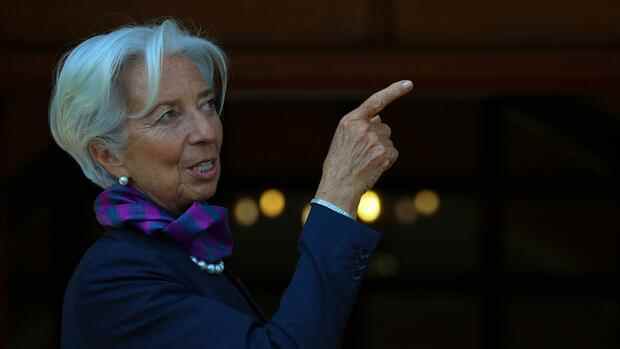In the coming week, the head of the central bank will report on the further course of monetary policy.
(Photo: IMAGO/NurPhoto)
Frankfurt In view of the high inflation, the debate in the ECB about an interest rate hike is gaining momentum. The conditions for an increase were discussed internally, according to the minutes of the March Governing Council meeting released on Thursday.
It was argued that the prerequisites for this were largely met or very close to being met. A large number of monetary authorities spoke out in favor of immediate further steps towards normalizing monetary policy.
According to the minutes, there was a discussion on the termination of the bond purchase program known by the abbreviation APP. As early as March, some members of the Governing Council wanted to put a firm end to this out of concern that they would otherwise lose touch with ongoing developments. Others were for “wait and see”. Chief economist Philip Lane’s proposal to make the stop dependent on the incoming data prevailed.
The ECB meets next Thursday for its next meeting. In doing so, she has to chart the course in times of the ongoing war in Ukraine. According to previous plans, the currency watchdogs want to end their bond purchases worth billions in the summer, if the inflation outlook allows it. The shutdown of the bond program is seen as a sign of a turnaround in interest rates that is to be initiated “some time” later.
Top jobs of the day
Find the best jobs now and
be notified by email.
The risk of stagflation also played a role in the March meeting. This combination of inflation and economic weakness is particularly difficult for monetary policymakers to manage. You then only have the choice of either fighting the high prices or the onset of the recession – both at the same time are hardly possible.
The document argued that the war in Ukraine “represents a stagflationary shock, with a slowdown in the economy and higher inflation in the short term.” The war drives up energy prices and thus inflation, but at the same time creates high levels of uncertainty and slows down the economy.
In addition, “stubbornly high and higher-than-expected inflation” seems to have heightened concerns about second-round effects. The dynamics of the labor market clearly point in this direction. What is meant is the dreaded wage-price spiral, in which consumer prices and wages skyrocket. According to the protocol, there was also concern that the effect of future wage increases could last for a long time and even accelerate.
skepticism about the model
According to the minutes, the meeting was also skeptical about the model on which the ECB’s forecasts are based and which Lane in particular often uses to argue. Literally it says: “It seemed astonishing that inflation in 2024 should still be slightly below the target of two percent, although inflation has repeatedly surprised at high levels and long-term inflation expectations have also increased recently.”
In this context, it was also mentioned that “models based on historical data have their limits” when unusual events or changes in the framework conditions occur.
Recently, representatives of the ECB had also expressed themselves. Lane told Greek broadcaster Antenna TV that inflation may peak by mid-year. The situation is “very dramatic”, but there are also reasons to slow down inflation.
Nagel hinted at a rate hike
In a lecture at the University of Cassino, the Italian Fabio Panetta called for greater support for financial policy through transfers and subsidies, for example in the energy sector, in order to cushion the consequences of high inflation. Bringing down near-term inflation when inflation expectations are well anchored would be “extremely expensive” in lost growth and jobs.
In an interview with Plusminus, however, Bundesbank President Joachim Nagel indicated “that savers may soon be able to look forward to higher interest rates again”.
The key interest rate is currently at a record low of 0.0 percent. The rate for commercial bank deposits at the ECB is minus 0.5 percent. In a Reuters poll of economists, 31 participants expect that this will only be increased in the fourth quarter. Ten respondents assume that this will happen in the summer quarter. And twelve experts expect no change.
More: Bundesbank boss Joachim Nagel: “We are experiencing a turning point”
